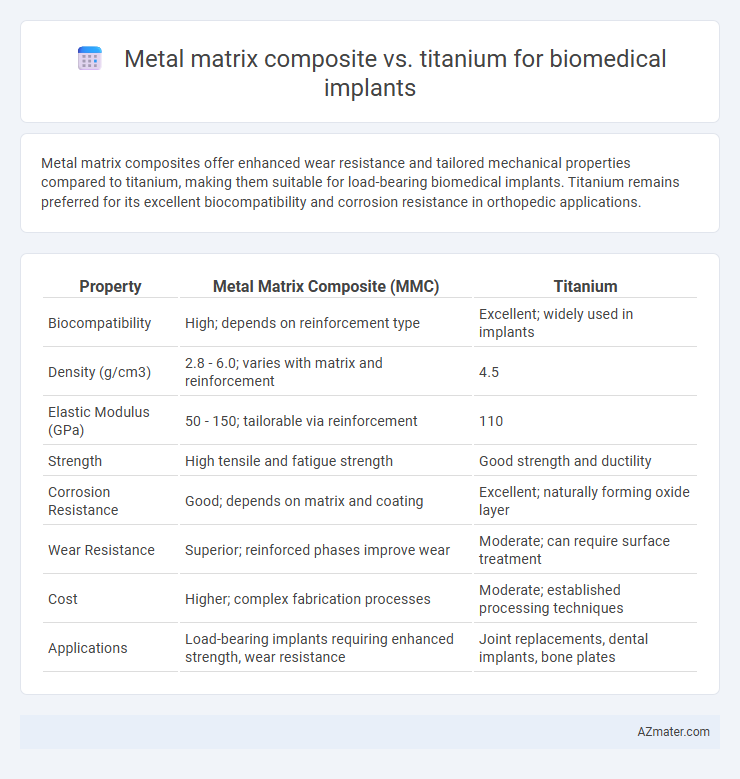Metal matrix composites offer enhanced wear resistance and tailored mechanical properties compared to titanium, making them suitable for load-bearing biomedical implants. Titanium remains preferred for its excellent biocompatibility and corrosion resistance in orthopedic applications.
Table of Comparison
| Property | Metal Matrix Composite (MMC) | Titanium |
|---|---|---|
| Biocompatibility | High; depends on reinforcement type | Excellent; widely used in implants |
| Density (g/cm3) | 2.8 - 6.0; varies with matrix and reinforcement | 4.5 |
| Elastic Modulus (GPa) | 50 - 150; tailorable via reinforcement | 110 |
| Strength | High tensile and fatigue strength | Good strength and ductility |
| Corrosion Resistance | Good; depends on matrix and coating | Excellent; naturally forming oxide layer |
| Wear Resistance | Superior; reinforced phases improve wear | Moderate; can require surface treatment |
| Cost | Higher; complex fabrication processes | Moderate; established processing techniques |
| Applications | Load-bearing implants requiring enhanced strength, wear resistance | Joint replacements, dental implants, bone plates |
Introduction to Biomedical Implant Materials
Metal matrix composites (MMCs) offer enhanced mechanical properties such as higher strength-to-weight ratios and improved wear resistance compared to traditional pure metals like titanium. Titanium is widely used in biomedical implants due to its excellent biocompatibility, corrosion resistance, and favorable osseointegration capabilities. Advancements in MMCs incorporating biocompatible reinforcements aim to surpass titanium's limitations by providing tailored stiffness and prolonged implant lifespan in medical applications.
Overview of Metal Matrix Composites (MMCs)
Metal matrix composites (MMCs) for biomedical implants combine a metal matrix, such as titanium or aluminum, with ceramic or ceramic-like reinforcements to enhance mechanical properties and biocompatibility. MMCs exhibit superior strength, wear resistance, and tailored stiffness compared to traditional titanium implants, reducing stress shielding and improving osseointegration. Advanced MMCs enable customization of implant properties for load-bearing applications, making them a promising alternative to pure titanium in orthopedic and dental devices.
Properties of Titanium in Biomedical Applications
Titanium exhibits exceptional biocompatibility, corrosion resistance, and a favorable strength-to-weight ratio, making it a preferred material for biomedical implants such as joint replacements and dental implants. Its ability to promote osseointegration ensures stable and long-lasting bone integration, critical for implant success. Furthermore, titanium's non-toxicity and resistance to bodily fluids minimize adverse immune reactions, enhancing patient safety and implant longevity.
Biocompatibility: MMCs vs Titanium
Metal matrix composites (MMCs) for biomedical implants exhibit enhanced mechanical properties and tailored degradation rates but often face challenges in biocompatibility due to potential particle release and corrosion byproducts. Titanium remains the gold standard for implants because of its excellent biocompatibility, corrosion resistance, and ability to support osseointegration without eliciting significant immune response. Comparative studies reveal titanium's superior long-term tissue integration and reduced cytotoxicity compared to many MMC formulations, making it preferable for critical load-bearing biomedical applications.
Mechanical Strength and Durability Comparison
Metal matrix composites (MMCs) exhibit superior mechanical strength and wear resistance compared to titanium, making them highly durable for load-bearing biomedical implants. Titanium alloys provide excellent biocompatibility and corrosion resistance but generally have lower stiffness and wear resistance than MMCs reinforced with ceramic particles or fibers. The enhanced mechanical properties of MMCs contribute to improved implant longevity and reduced risk of failure in harsh physiological environments.
Corrosion Resistance in Body Environments
Metal matrix composites (MMCs) exhibit superior corrosion resistance in physiological environments compared to pure titanium due to their tailored microstructure and protective ceramic reinforcements. Titanium offers excellent biocompatibility and forms a passive oxide layer, but it is susceptible to localized corrosion under certain body fluid conditions. MMCs, especially those reinforced with biocompatible ceramics like hydroxyapatite or alumina, enhance corrosion resistance by minimizing ion release and maintaining mechanical integrity in aggressive bodily fluids.
Osseointegration and Tissue Response
Metal matrix composites (MMCs) exhibit enhanced osseointegration compared to pure titanium due to their tailored surface properties and improved mechanical compatibility with bone tissue. MMCs can be engineered to release bioactive ions that stimulate osteoblast activity, promoting faster and stronger bone bonding. Titanium remains a gold standard for implants, offering excellent biocompatibility and corrosion resistance, but MMCs provide superior tissue response through optimized stiffness and improved wear resistance, reducing inflammation and improving long-term implant stability.
Manufacturing and Customization Capabilities
Metal matrix composites (MMCs) offer superior manufacturing flexibility through techniques like powder metallurgy, additive manufacturing, and spark plasma sintering, enabling precise control over microstructure and tailored mechanical properties for biomedical implants. Titanium, while renowned for its biocompatibility and corrosion resistance, faces limitations in customization due to challenges in machining and the relatively slower adoption of advanced additive manufacturing processes. MMCs demonstrate enhanced customization capabilities by allowing the integration of bioactive particles and the fabrication of complex geometries optimized for patient-specific implant requirements.
Cost-effectiveness and Market Availability
Metal matrix composites offer enhanced mechanical properties and corrosion resistance compared to pure titanium, making them a cost-effective alternative for biomedical implants with improved longevity and wear resistance. Titanium remains widely available and highly biocompatible but carries higher production costs due to complex manufacturing processes and material purity requirements. Market availability favors titanium with established supply chains, while metal matrix composites are gaining traction due to lower raw material costs and potential for customization in implant design.
Future Trends in Implant Material Innovation
Metal matrix composites (MMCs) offer enhanced wear resistance, tailored mechanical properties, and improved biocompatibility compared to traditional titanium implants, positioning them as promising candidates for next-generation biomedical applications. Advances in nanotechnology and additive manufacturing enable precise control over MMC microstructures, promoting faster osseointegration and reduced implant rejection rates. Future trends emphasize hybrid materials combining titanium and MMCs to optimize strength-to-weight ratios and corrosion resistance for long-term implant performance.

Infographic: Metal matrix composite vs Titanium for Biomedical implant
 azmater.com
azmater.com